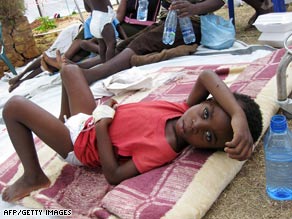
More than 60,000 people have now been infected with cholera in Zimbabwe, according to the World Health Organization (WHO).
Latest figures released Friday from the organization also show that 3,161 people have died from the disease since August 2008.
In December, WHO spokesman Paul Garwood told CNN the organization an estimated 60,000 people would be infected with cholera in the "worst case scenario."
But that number now stands at 60,401 and shows no sign of abating the agency said.
The WHO, a Geneva, Switzerland-based organization, said "drastic action," was now needed to curb one of the world’s largest outbreaks of cholera.
The UN agency called for "political differences to be put aside" and for international intervention to deal with the crisis.

"We are dealing with an extraordinary public health crisis that requires from us all an extraordinary public health emergency response, and this must happen now before the outbreak causes more needless suffering and death," the WHO’s Dr Eric Laroche said on its Web site.
"Political differences need to be put aside, economic barriers overcome, health services in the country’s periphery strengthened and community awareness to respond enhanced to save many more people from dying due to a disease that can be readily prevented and treated, " he added.
Since August, the cholera epidemic has swept through a country wracked with a political and economic crises. It has also coincided with a nearly five-month-long strike by doctors and nurses who are demanding salaries in foreign currency.
"In rural areas, 60 to 70 percent of boreholes (wells) are not working. So the international community might have come in but they have to address this infrastructure."
Zimbabwe was already suffering an enormous economic crisis, with a hyperinflationary economy and shortages of all essentials including food, fuel, cash, foreign currency and electricity.
The country’s rainy season peaks in January or February and ends in late March, and Zimbabwean Health Minister David Parirenyatwa warned the epidemic could get worse during that time as runoff from the rains spreads the bacteria to other rivers, streams and wells.
Mugabe declared in mid-December that the cholera epidemic had slowed, but health experts differed with him and the latest figures seem to contradict his statement

Leave Your Comments